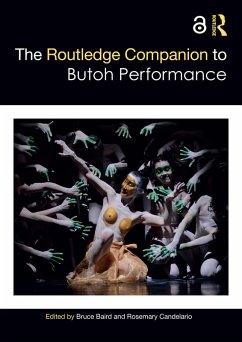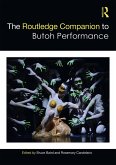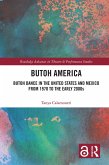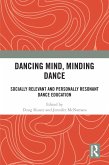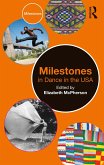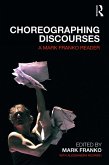The Routledge Companion to Butoh Performance (eBook, PDF)
Redaktion: Baird, Bruce; Candelario, Rosemary
44,95 €
44,95 €
inkl. MwSt.
Sofort per Download lieferbar

22 °P sammeln
44,95 €
Als Download kaufen

44,95 €
inkl. MwSt.
Sofort per Download lieferbar

22 °P sammeln
Jetzt verschenken
Alle Infos zum eBook verschenken
44,95 €
inkl. MwSt.
Sofort per Download lieferbar
Alle Infos zum eBook verschenken

22 °P sammeln
The Routledge Companion to Butoh Performance (eBook, PDF)
Redaktion: Baird, Bruce; Candelario, Rosemary
- Format: PDF
- Merkliste
- Auf die Merkliste
- Bewerten Bewerten
- Teilen
- Produkt teilen
- Produkterinnerung
- Produkterinnerung

Bitte loggen Sie sich zunächst in Ihr Kundenkonto ein oder registrieren Sie sich bei
bücher.de, um das eBook-Abo tolino select nutzen zu können.
Hier können Sie sich einloggen
Hier können Sie sich einloggen
Sie sind bereits eingeloggt. Klicken Sie auf 2. tolino select Abo, um fortzufahren.

Bitte loggen Sie sich zunächst in Ihr Kundenkonto ein oder registrieren Sie sich bei bücher.de, um das eBook-Abo tolino select nutzen zu können.
The Routledge Companion to Butoh Performance provides a comprehensive introduction to and analysis of this global art form.
- Geräte: PC
- mit Kopierschutz
- eBook Hilfe
- Größe: 8.7MB
Andere Kunden interessierten sich auch für
![The Routledge Companion to Butoh Performance (eBook, ePUB) The Routledge Companion to Butoh Performance (eBook, ePUB)]() The Routledge Companion to Butoh Performance (eBook, ePUB)44,95 €
The Routledge Companion to Butoh Performance (eBook, ePUB)44,95 €![Commercial Dance (eBook, PDF) Commercial Dance (eBook, PDF)]() Anthony R. TrahearnCommercial Dance (eBook, PDF)41,95 €
Anthony R. TrahearnCommercial Dance (eBook, PDF)41,95 €![Butoh America (eBook, PDF) Butoh America (eBook, PDF)]() Tanya CalamoneriButoh America (eBook, PDF)41,95 €
Tanya CalamoneriButoh America (eBook, PDF)41,95 €![Dancing Mind, Minding Dance (eBook, PDF) Dancing Mind, Minding Dance (eBook, PDF)]() Dancing Mind, Minding Dance (eBook, PDF)41,95 €
Dancing Mind, Minding Dance (eBook, PDF)41,95 €![Milestones in Dance in the USA (eBook, PDF) Milestones in Dance in the USA (eBook, PDF)]() Milestones in Dance in the USA (eBook, PDF)36,95 €
Milestones in Dance in the USA (eBook, PDF)36,95 €![Choreographing Discourses (eBook, PDF) Choreographing Discourses (eBook, PDF)]() Mark FrankoChoreographing Discourses (eBook, PDF)38,95 €
Mark FrankoChoreographing Discourses (eBook, PDF)38,95 €![Reading the Puppet Stage (eBook, PDF) Reading the Puppet Stage (eBook, PDF)]() Claudia OrensteinReading the Puppet Stage (eBook, PDF)34,95 €
Claudia OrensteinReading the Puppet Stage (eBook, PDF)34,95 €-
-
-
The Routledge Companion to Butoh Performance provides a comprehensive introduction to and analysis of this global art form.
Dieser Download kann aus rechtlichen Gründen nur mit Rechnungsadresse in A, B, BG, CY, CZ, D, DK, EW, E, FIN, F, GR, HR, H, IRL, I, LT, L, LR, M, NL, PL, P, R, S, SLO, SK ausgeliefert werden.
Produktdetails
- Produktdetails
- Verlag: Taylor & Francis
- Seitenzahl: 588
- Erscheinungstermin: 3. September 2018
- Englisch
- ISBN-13: 9781315536125
- Artikelnr.: 54184003
- Verlag: Taylor & Francis
- Seitenzahl: 588
- Erscheinungstermin: 3. September 2018
- Englisch
- ISBN-13: 9781315536125
- Artikelnr.: 54184003
- Herstellerkennzeichnung Die Herstellerinformationen sind derzeit nicht verfügbar.
Bruce Baird is Associate Professor of East Asian Languages and Cultures at the University of Massachusetts Amherst, USA. Rosemary Candelario is Associate Professor of Dance at Texas Woman's University, USA.
List of figures
List of contributors
Acknowledgements
A note on Japanese names and words
Introduction: dance experience, dance of darkness, global butoh: the evolution of a new dance form - Bruce Baird and Rosemary Candelario
Section 1: Butoh instigators and interlocutors
1. On the eve of the birth of ankoku butoh: postwar Japanese modern dance and Ohno Kazuo - Kuniyoshi Kazuko (translated by Bruce Baird)
2.From vodou to butoh: Hijikata Tatsumi, Katherine Dunham, and the trans-Pacific remaking of blackness - Arimitsu Michio
3. Contemporary nightmare: an avant-garde dance group dances Forbidden Colors - Mishima Yukio (translated by Bruce Baird)
4. The relationship between avant-garde dance and things - Mishima Yukio (translated by Bruce Baird)
5. Rethinking the "indigeneity" of Hijikata Tatsumi in the 1960s as a photographic negative image of Japanese dance history - Inata Naomi (translated by Bruce Baird and the author)
6. À la maison de Shibusawa: the draconian aspects of Hijikata's butoh - Robert Ono
7. Hijikata Tatsumi: burnt offering dancer - Shibusawa Tatsuhiko (translated by Robert Ono)
8. A certain kind of energy: dancing modern anxiety - Shibusawa Tatsuhiko (translated by Robert Ono)
9. Butoh and taboo - Gunji Masakatsu (translated by Jane Traynor)
10. "Inserting the hip/s" and "lowering the hip/s" excerpt from Chapter 1, "That Which Is Nanba-like" from What Are Traditional Arts? A Dialogue for Criticism and Creation - Takechi Tetsuji and Tomioka Taeko (translated and with an introductory essay by Maki Isaka)
11. The problematics of butoh and the essentialist trap - William Marotti
12. Returns and repetitions: Hijikata Tatsumi's choreographic practice as a critical gesture of temporalization - Sara Jansen
13. Ohno Kazuo: biography and methods of movement creation - Lucia Schwellinger (translated by Charlotte Marr and Rosemary Candelario)
14. What we know and what we want to know: a roundtable on butoh and neuer Tanz - Kate Elswit, Mariko Miyagawa, Eiko Otake, and Tara Rodman
15. Oikawa Hironobu: bringing Decroux and Artaud into Japanese dance practices - Yoshida Yukihiko (translated by Bruce Baird)
16. Foundations and filiations: the legacy of Artaud in Hijikata Tatsumi - Samantha Marenzi
17. Butoh's remediation and the anarchic transforming politics of the body in the 1960s - Peter Eckersall
18. Bodies at the threshold of the visible: photographic butoh - Jonathan W. Marshall
19. The book of butoh; the book of the dead - Uno Kuniichi (translated by Bruce Baird)
Section 2: The second generation
20. "Open butoh:" Dairakudakan and Maro Akaji - Tomoe Aihara (translated by Robert Ono)
21. Growing new life: Kasai Akira's butoh - Megan V. Nicely
22. Light as dust, hard as steel, fluid as snake saliva: the Butoh Body of Ashikawa Yoko - SU-EN
23. The expanding universe of butoh: the challenge of Bishop Yamada in Hoppo Butoh-ha and Shiokubi (1975) - Kosuge Hayato
24. Murobushi K and his challenge to butoh - Katja Centonze
25. Oscillation and regeneration: the temporal aesthetics of Sankai Juku - Iwaki Kyoko
Section 3: New sites for butoh
26. "Now we have a passport": global and local butoh - Rosemary Candelario
27. A history of French fascination with butoh - Sylviane Pagès (translated by Sherwood Chen)
28. The concept of butoh in Italy, from Ohno Kazuo to Kasai Akira - Maria Pia D'Orazi
29. German butoh since the late 1980s: Tadashi Endo, Yumiko Yoshioka, and Minako Seki - Rosa van Hensbergen
30. SU-EN Butoh Company - body, nature, and the world - SU-EN
31. Butoh in Brazil: historical context and political reenactment - Christine Greiner
32. A sun more alive: butoh in Mexico - Gustavo Emilio Rosales (translated by Jordan A. Y. Smith)
33. Global butoh as experienced in San Francisco - Brechin Flournoy
34. LEIMAY, CAVE, and the New York Butoh Festival - Ximena Garnica
35. Iraqi Bodies' The Baldheaded: "butoh"-inspired Iraqi contemporary performance - J Dellecave
36. "We need to keep one eye open ...": approaching butoh at sites of personal and cultural resistance - Jeremy Neideck
Section 4: Politics, gender, identity
37. Butoh's genders: men in dresses and girl-like women - Katherine Mezur
38. Death rituals and survival acts: Hata-Kanoko's "butoh action" and alternative inter-Asian transnationalism - Chiayi Seetoo
39. When the "revolt of the flesh" becomes political protest: the nomadic tactics of butoh-inspired interventions - Carla Melo
40. Butoh beyond the body: an interview with Shakina Nayfack on transition, evolution and the spirit at war - Jacquelyn Marie Shannon
41. Critical Butoh and the colonial matrix of power - Miki Seifert
Section 5: Pedagogy and practice
42. The daily practice of Hijikata Tatsumi's apprentices from 1969 to 1978 - Caitlin Coker
43. Butoh pedagogy in historical and contemporary practice - Tanya Calamoneri
44. Waguri Yukio's Butoh Kaden: taking stock of Hijikata's butoh notation - Rosa van Hensbergen
45. A flower of butoh: my daily dance with Ohno Kazuo (1995-2012) - Maureen Momo Freehill
46. On and through the butoh body - Katherine Adamenko
47. My Dairakudakan experience - Julia A. Vessey
48. Butoh as an approach to performance in South Africa - jackï job
49. Wrecking butoh: dancing poetic shores - Bronwyn Preece
Section 6: Beyond butoh
50. Tanaka Min: the dance of life - Zack Fuller
51. Body Weather Laboratory Los Angeles: an interview with Roxanne Steinberg and Oguri - Joyce Lu
52. The cinematic forms of butoh films - Aaron Kerner
53. Locus solus - locus fracta: butoh dance as protocol for visual self-representation - Lucile Druet
54. Ohno Kazuo's lessons for a French choreographer: Ô Sensei by Catherine Diverrès - Miyagawa Mariko
55. Michael Sakamoto and the breaks: revolt of the head (MuNK remix) - Michael Sakamoto
56. Burn butoh, start again - Shinichi Iova-Koga
Index
List of contributors
Acknowledgements
A note on Japanese names and words
Introduction: dance experience, dance of darkness, global butoh: the evolution of a new dance form - Bruce Baird and Rosemary Candelario
Section 1: Butoh instigators and interlocutors
1. On the eve of the birth of ankoku butoh: postwar Japanese modern dance and Ohno Kazuo - Kuniyoshi Kazuko (translated by Bruce Baird)
2.From vodou to butoh: Hijikata Tatsumi, Katherine Dunham, and the trans-Pacific remaking of blackness - Arimitsu Michio
3. Contemporary nightmare: an avant-garde dance group dances Forbidden Colors - Mishima Yukio (translated by Bruce Baird)
4. The relationship between avant-garde dance and things - Mishima Yukio (translated by Bruce Baird)
5. Rethinking the "indigeneity" of Hijikata Tatsumi in the 1960s as a photographic negative image of Japanese dance history - Inata Naomi (translated by Bruce Baird and the author)
6. À la maison de Shibusawa: the draconian aspects of Hijikata's butoh - Robert Ono
7. Hijikata Tatsumi: burnt offering dancer - Shibusawa Tatsuhiko (translated by Robert Ono)
8. A certain kind of energy: dancing modern anxiety - Shibusawa Tatsuhiko (translated by Robert Ono)
9. Butoh and taboo - Gunji Masakatsu (translated by Jane Traynor)
10. "Inserting the hip/s" and "lowering the hip/s" excerpt from Chapter 1, "That Which Is Nanba-like" from What Are Traditional Arts? A Dialogue for Criticism and Creation - Takechi Tetsuji and Tomioka Taeko (translated and with an introductory essay by Maki Isaka)
11. The problematics of butoh and the essentialist trap - William Marotti
12. Returns and repetitions: Hijikata Tatsumi's choreographic practice as a critical gesture of temporalization - Sara Jansen
13. Ohno Kazuo: biography and methods of movement creation - Lucia Schwellinger (translated by Charlotte Marr and Rosemary Candelario)
14. What we know and what we want to know: a roundtable on butoh and neuer Tanz - Kate Elswit, Mariko Miyagawa, Eiko Otake, and Tara Rodman
15. Oikawa Hironobu: bringing Decroux and Artaud into Japanese dance practices - Yoshida Yukihiko (translated by Bruce Baird)
16. Foundations and filiations: the legacy of Artaud in Hijikata Tatsumi - Samantha Marenzi
17. Butoh's remediation and the anarchic transforming politics of the body in the 1960s - Peter Eckersall
18. Bodies at the threshold of the visible: photographic butoh - Jonathan W. Marshall
19. The book of butoh; the book of the dead - Uno Kuniichi (translated by Bruce Baird)
Section 2: The second generation
20. "Open butoh:" Dairakudakan and Maro Akaji - Tomoe Aihara (translated by Robert Ono)
21. Growing new life: Kasai Akira's butoh - Megan V. Nicely
22. Light as dust, hard as steel, fluid as snake saliva: the Butoh Body of Ashikawa Yoko - SU-EN
23. The expanding universe of butoh: the challenge of Bishop Yamada in Hoppo Butoh-ha and Shiokubi (1975) - Kosuge Hayato
24. Murobushi K and his challenge to butoh - Katja Centonze
25. Oscillation and regeneration: the temporal aesthetics of Sankai Juku - Iwaki Kyoko
Section 3: New sites for butoh
26. "Now we have a passport": global and local butoh - Rosemary Candelario
27. A history of French fascination with butoh - Sylviane Pagès (translated by Sherwood Chen)
28. The concept of butoh in Italy, from Ohno Kazuo to Kasai Akira - Maria Pia D'Orazi
29. German butoh since the late 1980s: Tadashi Endo, Yumiko Yoshioka, and Minako Seki - Rosa van Hensbergen
30. SU-EN Butoh Company - body, nature, and the world - SU-EN
31. Butoh in Brazil: historical context and political reenactment - Christine Greiner
32. A sun more alive: butoh in Mexico - Gustavo Emilio Rosales (translated by Jordan A. Y. Smith)
33. Global butoh as experienced in San Francisco - Brechin Flournoy
34. LEIMAY, CAVE, and the New York Butoh Festival - Ximena Garnica
35. Iraqi Bodies' The Baldheaded: "butoh"-inspired Iraqi contemporary performance - J Dellecave
36. "We need to keep one eye open ...": approaching butoh at sites of personal and cultural resistance - Jeremy Neideck
Section 4: Politics, gender, identity
37. Butoh's genders: men in dresses and girl-like women - Katherine Mezur
38. Death rituals and survival acts: Hata-Kanoko's "butoh action" and alternative inter-Asian transnationalism - Chiayi Seetoo
39. When the "revolt of the flesh" becomes political protest: the nomadic tactics of butoh-inspired interventions - Carla Melo
40. Butoh beyond the body: an interview with Shakina Nayfack on transition, evolution and the spirit at war - Jacquelyn Marie Shannon
41. Critical Butoh and the colonial matrix of power - Miki Seifert
Section 5: Pedagogy and practice
42. The daily practice of Hijikata Tatsumi's apprentices from 1969 to 1978 - Caitlin Coker
43. Butoh pedagogy in historical and contemporary practice - Tanya Calamoneri
44. Waguri Yukio's Butoh Kaden: taking stock of Hijikata's butoh notation - Rosa van Hensbergen
45. A flower of butoh: my daily dance with Ohno Kazuo (1995-2012) - Maureen Momo Freehill
46. On and through the butoh body - Katherine Adamenko
47. My Dairakudakan experience - Julia A. Vessey
48. Butoh as an approach to performance in South Africa - jackï job
49. Wrecking butoh: dancing poetic shores - Bronwyn Preece
Section 6: Beyond butoh
50. Tanaka Min: the dance of life - Zack Fuller
51. Body Weather Laboratory Los Angeles: an interview with Roxanne Steinberg and Oguri - Joyce Lu
52. The cinematic forms of butoh films - Aaron Kerner
53. Locus solus - locus fracta: butoh dance as protocol for visual self-representation - Lucile Druet
54. Ohno Kazuo's lessons for a French choreographer: Ô Sensei by Catherine Diverrès - Miyagawa Mariko
55. Michael Sakamoto and the breaks: revolt of the head (MuNK remix) - Michael Sakamoto
56. Burn butoh, start again - Shinichi Iova-Koga
Index
List of figures
List of contributors
Acknowledgements
A note on Japanese names and words
Introduction: dance experience, dance of darkness, global butoh: the evolution of a new dance form - Bruce Baird and Rosemary Candelario
Section 1: Butoh instigators and interlocutors
1. On the eve of the birth of ankoku butoh: postwar Japanese modern dance and Ohno Kazuo - Kuniyoshi Kazuko (translated by Bruce Baird)
2.From vodou to butoh: Hijikata Tatsumi, Katherine Dunham, and the trans-Pacific remaking of blackness - Arimitsu Michio
3. Contemporary nightmare: an avant-garde dance group dances Forbidden Colors - Mishima Yukio (translated by Bruce Baird)
4. The relationship between avant-garde dance and things - Mishima Yukio (translated by Bruce Baird)
5. Rethinking the "indigeneity" of Hijikata Tatsumi in the 1960s as a photographic negative image of Japanese dance history - Inata Naomi (translated by Bruce Baird and the author)
6. À la maison de Shibusawa: the draconian aspects of Hijikata's butoh - Robert Ono
7. Hijikata Tatsumi: burnt offering dancer - Shibusawa Tatsuhiko (translated by Robert Ono)
8. A certain kind of energy: dancing modern anxiety - Shibusawa Tatsuhiko (translated by Robert Ono)
9. Butoh and taboo - Gunji Masakatsu (translated by Jane Traynor)
10. "Inserting the hip/s" and "lowering the hip/s" excerpt from Chapter 1, "That Which Is Nanba-like" from What Are Traditional Arts? A Dialogue for Criticism and Creation - Takechi Tetsuji and Tomioka Taeko (translated and with an introductory essay by Maki Isaka)
11. The problematics of butoh and the essentialist trap - William Marotti
12. Returns and repetitions: Hijikata Tatsumi's choreographic practice as a critical gesture of temporalization - Sara Jansen
13. Ohno Kazuo: biography and methods of movement creation - Lucia Schwellinger (translated by Charlotte Marr and Rosemary Candelario)
14. What we know and what we want to know: a roundtable on butoh and neuer Tanz - Kate Elswit, Mariko Miyagawa, Eiko Otake, and Tara Rodman
15. Oikawa Hironobu: bringing Decroux and Artaud into Japanese dance practices - Yoshida Yukihiko (translated by Bruce Baird)
16. Foundations and filiations: the legacy of Artaud in Hijikata Tatsumi - Samantha Marenzi
17. Butoh's remediation and the anarchic transforming politics of the body in the 1960s - Peter Eckersall
18. Bodies at the threshold of the visible: photographic butoh - Jonathan W. Marshall
19. The book of butoh; the book of the dead - Uno Kuniichi (translated by Bruce Baird)
Section 2: The second generation
20. "Open butoh:" Dairakudakan and Maro Akaji - Tomoe Aihara (translated by Robert Ono)
21. Growing new life: Kasai Akira's butoh - Megan V. Nicely
22. Light as dust, hard as steel, fluid as snake saliva: the Butoh Body of Ashikawa Yoko - SU-EN
23. The expanding universe of butoh: the challenge of Bishop Yamada in Hoppo Butoh-ha and Shiokubi (1975) - Kosuge Hayato
24. Murobushi K and his challenge to butoh - Katja Centonze
25. Oscillation and regeneration: the temporal aesthetics of Sankai Juku - Iwaki Kyoko
Section 3: New sites for butoh
26. "Now we have a passport": global and local butoh - Rosemary Candelario
27. A history of French fascination with butoh - Sylviane Pagès (translated by Sherwood Chen)
28. The concept of butoh in Italy, from Ohno Kazuo to Kasai Akira - Maria Pia D'Orazi
29. German butoh since the late 1980s: Tadashi Endo, Yumiko Yoshioka, and Minako Seki - Rosa van Hensbergen
30. SU-EN Butoh Company - body, nature, and the world - SU-EN
31. Butoh in Brazil: historical context and political reenactment - Christine Greiner
32. A sun more alive: butoh in Mexico - Gustavo Emilio Rosales (translated by Jordan A. Y. Smith)
33. Global butoh as experienced in San Francisco - Brechin Flournoy
34. LEIMAY, CAVE, and the New York Butoh Festival - Ximena Garnica
35. Iraqi Bodies' The Baldheaded: "butoh"-inspired Iraqi contemporary performance - J Dellecave
36. "We need to keep one eye open ...": approaching butoh at sites of personal and cultural resistance - Jeremy Neideck
Section 4: Politics, gender, identity
37. Butoh's genders: men in dresses and girl-like women - Katherine Mezur
38. Death rituals and survival acts: Hata-Kanoko's "butoh action" and alternative inter-Asian transnationalism - Chiayi Seetoo
39. When the "revolt of the flesh" becomes political protest: the nomadic tactics of butoh-inspired interventions - Carla Melo
40. Butoh beyond the body: an interview with Shakina Nayfack on transition, evolution and the spirit at war - Jacquelyn Marie Shannon
41. Critical Butoh and the colonial matrix of power - Miki Seifert
Section 5: Pedagogy and practice
42. The daily practice of Hijikata Tatsumi's apprentices from 1969 to 1978 - Caitlin Coker
43. Butoh pedagogy in historical and contemporary practice - Tanya Calamoneri
44. Waguri Yukio's Butoh Kaden: taking stock of Hijikata's butoh notation - Rosa van Hensbergen
45. A flower of butoh: my daily dance with Ohno Kazuo (1995-2012) - Maureen Momo Freehill
46. On and through the butoh body - Katherine Adamenko
47. My Dairakudakan experience - Julia A. Vessey
48. Butoh as an approach to performance in South Africa - jackï job
49. Wrecking butoh: dancing poetic shores - Bronwyn Preece
Section 6: Beyond butoh
50. Tanaka Min: the dance of life - Zack Fuller
51. Body Weather Laboratory Los Angeles: an interview with Roxanne Steinberg and Oguri - Joyce Lu
52. The cinematic forms of butoh films - Aaron Kerner
53. Locus solus - locus fracta: butoh dance as protocol for visual self-representation - Lucile Druet
54. Ohno Kazuo's lessons for a French choreographer: Ô Sensei by Catherine Diverrès - Miyagawa Mariko
55. Michael Sakamoto and the breaks: revolt of the head (MuNK remix) - Michael Sakamoto
56. Burn butoh, start again - Shinichi Iova-Koga
Index
List of contributors
Acknowledgements
A note on Japanese names and words
Introduction: dance experience, dance of darkness, global butoh: the evolution of a new dance form - Bruce Baird and Rosemary Candelario
Section 1: Butoh instigators and interlocutors
1. On the eve of the birth of ankoku butoh: postwar Japanese modern dance and Ohno Kazuo - Kuniyoshi Kazuko (translated by Bruce Baird)
2.From vodou to butoh: Hijikata Tatsumi, Katherine Dunham, and the trans-Pacific remaking of blackness - Arimitsu Michio
3. Contemporary nightmare: an avant-garde dance group dances Forbidden Colors - Mishima Yukio (translated by Bruce Baird)
4. The relationship between avant-garde dance and things - Mishima Yukio (translated by Bruce Baird)
5. Rethinking the "indigeneity" of Hijikata Tatsumi in the 1960s as a photographic negative image of Japanese dance history - Inata Naomi (translated by Bruce Baird and the author)
6. À la maison de Shibusawa: the draconian aspects of Hijikata's butoh - Robert Ono
7. Hijikata Tatsumi: burnt offering dancer - Shibusawa Tatsuhiko (translated by Robert Ono)
8. A certain kind of energy: dancing modern anxiety - Shibusawa Tatsuhiko (translated by Robert Ono)
9. Butoh and taboo - Gunji Masakatsu (translated by Jane Traynor)
10. "Inserting the hip/s" and "lowering the hip/s" excerpt from Chapter 1, "That Which Is Nanba-like" from What Are Traditional Arts? A Dialogue for Criticism and Creation - Takechi Tetsuji and Tomioka Taeko (translated and with an introductory essay by Maki Isaka)
11. The problematics of butoh and the essentialist trap - William Marotti
12. Returns and repetitions: Hijikata Tatsumi's choreographic practice as a critical gesture of temporalization - Sara Jansen
13. Ohno Kazuo: biography and methods of movement creation - Lucia Schwellinger (translated by Charlotte Marr and Rosemary Candelario)
14. What we know and what we want to know: a roundtable on butoh and neuer Tanz - Kate Elswit, Mariko Miyagawa, Eiko Otake, and Tara Rodman
15. Oikawa Hironobu: bringing Decroux and Artaud into Japanese dance practices - Yoshida Yukihiko (translated by Bruce Baird)
16. Foundations and filiations: the legacy of Artaud in Hijikata Tatsumi - Samantha Marenzi
17. Butoh's remediation and the anarchic transforming politics of the body in the 1960s - Peter Eckersall
18. Bodies at the threshold of the visible: photographic butoh - Jonathan W. Marshall
19. The book of butoh; the book of the dead - Uno Kuniichi (translated by Bruce Baird)
Section 2: The second generation
20. "Open butoh:" Dairakudakan and Maro Akaji - Tomoe Aihara (translated by Robert Ono)
21. Growing new life: Kasai Akira's butoh - Megan V. Nicely
22. Light as dust, hard as steel, fluid as snake saliva: the Butoh Body of Ashikawa Yoko - SU-EN
23. The expanding universe of butoh: the challenge of Bishop Yamada in Hoppo Butoh-ha and Shiokubi (1975) - Kosuge Hayato
24. Murobushi K and his challenge to butoh - Katja Centonze
25. Oscillation and regeneration: the temporal aesthetics of Sankai Juku - Iwaki Kyoko
Section 3: New sites for butoh
26. "Now we have a passport": global and local butoh - Rosemary Candelario
27. A history of French fascination with butoh - Sylviane Pagès (translated by Sherwood Chen)
28. The concept of butoh in Italy, from Ohno Kazuo to Kasai Akira - Maria Pia D'Orazi
29. German butoh since the late 1980s: Tadashi Endo, Yumiko Yoshioka, and Minako Seki - Rosa van Hensbergen
30. SU-EN Butoh Company - body, nature, and the world - SU-EN
31. Butoh in Brazil: historical context and political reenactment - Christine Greiner
32. A sun more alive: butoh in Mexico - Gustavo Emilio Rosales (translated by Jordan A. Y. Smith)
33. Global butoh as experienced in San Francisco - Brechin Flournoy
34. LEIMAY, CAVE, and the New York Butoh Festival - Ximena Garnica
35. Iraqi Bodies' The Baldheaded: "butoh"-inspired Iraqi contemporary performance - J Dellecave
36. "We need to keep one eye open ...": approaching butoh at sites of personal and cultural resistance - Jeremy Neideck
Section 4: Politics, gender, identity
37. Butoh's genders: men in dresses and girl-like women - Katherine Mezur
38. Death rituals and survival acts: Hata-Kanoko's "butoh action" and alternative inter-Asian transnationalism - Chiayi Seetoo
39. When the "revolt of the flesh" becomes political protest: the nomadic tactics of butoh-inspired interventions - Carla Melo
40. Butoh beyond the body: an interview with Shakina Nayfack on transition, evolution and the spirit at war - Jacquelyn Marie Shannon
41. Critical Butoh and the colonial matrix of power - Miki Seifert
Section 5: Pedagogy and practice
42. The daily practice of Hijikata Tatsumi's apprentices from 1969 to 1978 - Caitlin Coker
43. Butoh pedagogy in historical and contemporary practice - Tanya Calamoneri
44. Waguri Yukio's Butoh Kaden: taking stock of Hijikata's butoh notation - Rosa van Hensbergen
45. A flower of butoh: my daily dance with Ohno Kazuo (1995-2012) - Maureen Momo Freehill
46. On and through the butoh body - Katherine Adamenko
47. My Dairakudakan experience - Julia A. Vessey
48. Butoh as an approach to performance in South Africa - jackï job
49. Wrecking butoh: dancing poetic shores - Bronwyn Preece
Section 6: Beyond butoh
50. Tanaka Min: the dance of life - Zack Fuller
51. Body Weather Laboratory Los Angeles: an interview with Roxanne Steinberg and Oguri - Joyce Lu
52. The cinematic forms of butoh films - Aaron Kerner
53. Locus solus - locus fracta: butoh dance as protocol for visual self-representation - Lucile Druet
54. Ohno Kazuo's lessons for a French choreographer: Ô Sensei by Catherine Diverrès - Miyagawa Mariko
55. Michael Sakamoto and the breaks: revolt of the head (MuNK remix) - Michael Sakamoto
56. Burn butoh, start again - Shinichi Iova-Koga
Index
